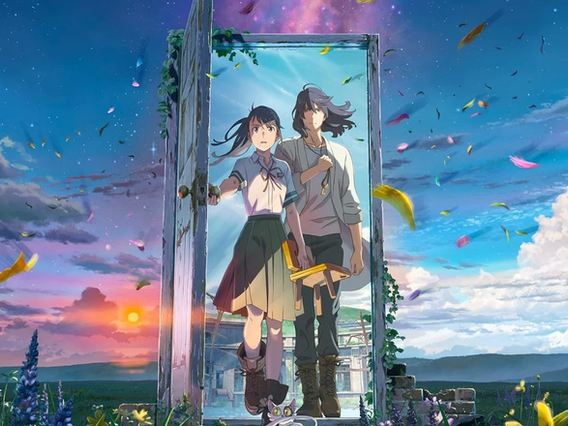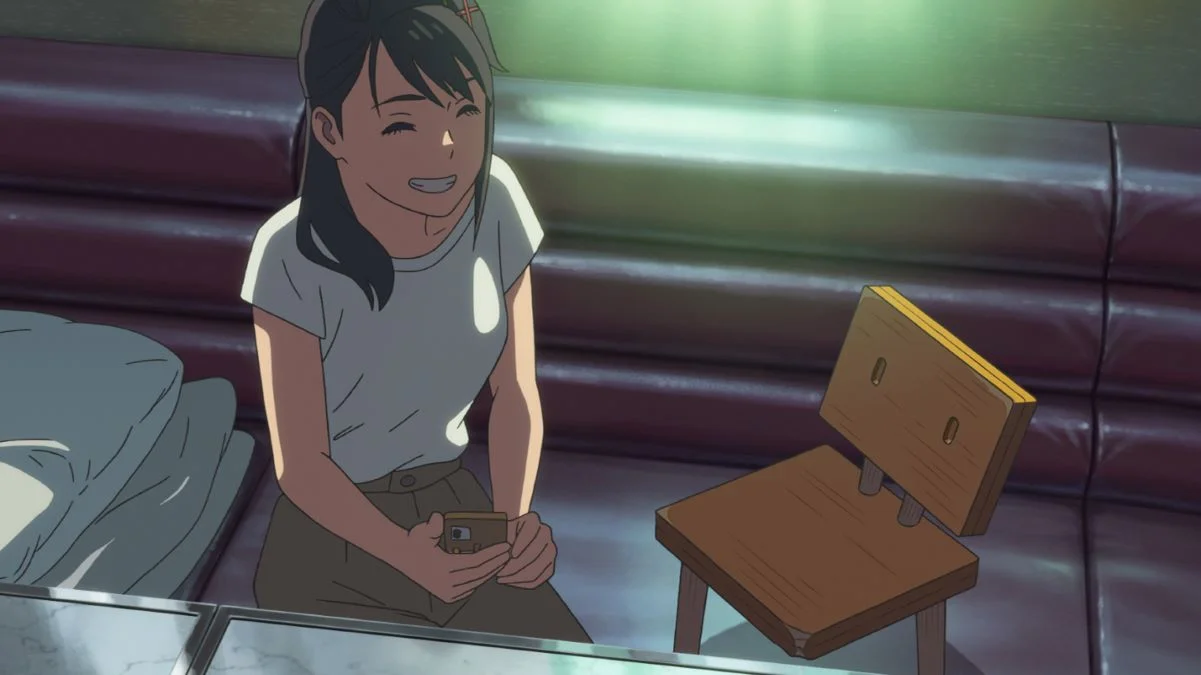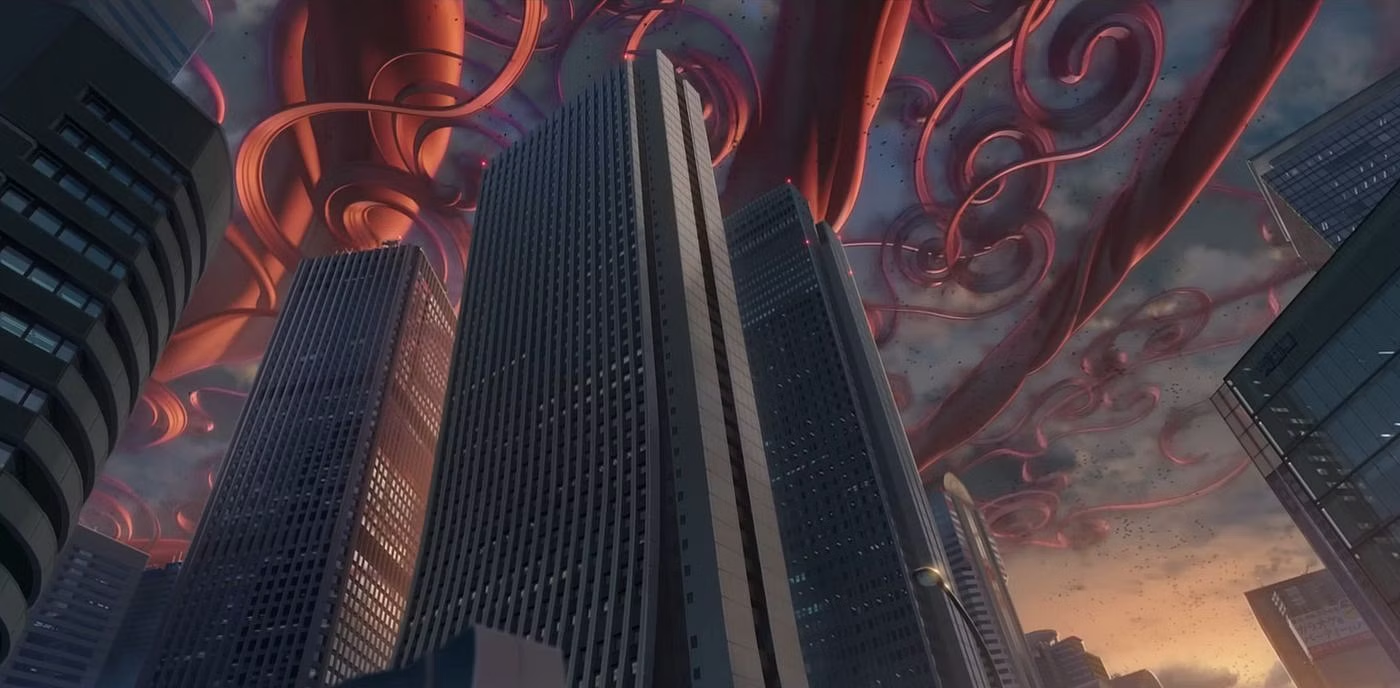Suzume (2022)—Brutal, Hopeful and Frustrating

Buckle up folks, here we go again. The last time I’ve talked about Makoto Shinkai on Film Purgatory, I wasn’t exactly at my nicest. And since he came out with another film only two years ago, it’s only fair that I give it a watch. If you’re new here, who is Makoto Shinkai you may ask? He’s the directorial genius behind films like 5 Centimeters per Second, Your Name, and (unfortunately) Weathering with You. And lately, people in the anime sphere can’t seem to shut up about his newest film: Suzume. But then again, they did the same with Weathering with You. So this begs the question: is it really as good as everyone cracks it up to be?
Suzume (voiced by Nichole Sakura) is a junior in high school who lives in the Kyushu region with her single aunt after tragically losing her mother in a tsunami when she was four. One day she meets a strange young man named Sota (voiced by Josh Keaton) who is looking for some ruins. Out of curiosity, she follows him and finds a mysterious door that, when opened, leads to a field in a starry night sky. The door remains open too long, releasing a sinister dark red tendril of energy that nearly destroys the surrounding area. With the help of Suzume, Sota manages to close the door, but not before the keystone which has kept the evil out is turned into a small white cat named Daijin. Daijin turns Sota into a chair while leading the two to the other doors all around Japan as the two hurry to close them before the evil can escape.

Unfortunately, I wasn’t able to see this movie in theaters when it was released (actually, I was never able to see any of Makoto Shinkai’s films in theaters). And I wish I did. Even if you hate anime, Suzume truly is a visual spectacle that should be experienced on screen. I said it before and I’ll say it again: Makoto Shinkai truly shines when he puts the film’s visual spectacle on full display. Every frame is full of life and brimming with detail, every brick in the background, every face in the sea of faces, is filled out. One recurring element that I’ve noticed in his past films, but never explicitly talked about is the presence of background dialogue. Plenty of films don’t pay attention to background characters, rather they merely treat them as just props for the setting. But Shinkai manages to give his background characters dialogue that fills the silence in between scenes or during moments of reflection to make them feel like actual people rather than just props. And this tells me just how much emphasis he places on attention to detail.
Compared to his other films, Suzume feels more like an epic fantasy rather than a slice of life drama. We get large scale action, the presence of magic and the forces of good vs evil. Hell, we even get talking animal sidekicks! Let’s just say if you’re a cat lover, you’ll love this film. If you ask me, it looks like Makoto Shinkai drew a lot of inspiration from Hayao Miyazaki’s Princess Mononoke while doing his own unique spin on it. The dark tendrils of energy not only appear malicious, but they also resemble the hatred virus infecting the animals in Miyazaki’s film. With every door Suzume and Sota come across, the more powerful and demonic the tendrils appear. I’m not sure if this similarity was intentional or not, but as a visual cue, it works wonderfully. Continuing off with that thread, Suzume probably has the most unique soundtrack of all of Makoto Shinkai’s movies. Even though the band Radwimps returned to sing the main song, the soundtrack itself primarily consists of ominous chanting and orchestral vocalizations, especially during the scenes where the dark tendrils are released. This further highlights the dread of the current situation and what may happen should Suzume and Sota fail.

Makoto Shinkai drew his inspiration for the film when he was on tour promoting Weathering with You. Going off of the recurring theme of natural disaster and romance, Suzume was made to remember the desolated areas of Japan. When I was watching Suzume, I kept trying to find the overarching theme of the film. It seemed like a story centered on overcoming grief, since Suzume has recurring dreams about encountering a stranger who resembled her mother gifting her the chair her mother made. However, the more I thought about it, the more I realized that the film was trying to address fear, more specifically, fear of the future. As a little girl who recently lost her mom, Suzume is fearful of what life held in store for her. But during her adventure across Japan, she ends up meeting several wonderful and kind people who offer her transportation, shelter, food and clothing. It goes to say that even though we are told the world is a cruel and wicked place, there are so many silver linings that present themselves to us when we’re at our lowest.
Compared to Makoto Shinkai’s previous films, I think Suzume has the worst pacing of the bunch. It really feels like it’s trying to justify its two hour long run time. Several scenes slog on and you sometimes feel like there’s no sense of direction on where the film is going. In fact, I actually had to pause the film to go take a walk just because I was beginning to get bored. This is especially apparent towards the end of the second and the beginning of the third acts, when Suzume’s aunt (and legal guardian) joins her in the search for the last door. Was the film trying to address the difficulties of being a single parent to a child that’s not your own? I suppose so, but it was done in a rather sloppy way. And then there’s the film’s struggle to properly release built up tension. There are several key moments where the film tries to throw a curve ball or ramp up the drama, but fails to properly release that tension. Rather it just fizzles out like a sad can of expired soda.

If I were to compare Suzume with Makoto Shinkai’s other films, I’d rank it above Weathering with You due to having more likable and relatable main and side characters. However, it pales in comparison to his two powerhouse films, Your Name and 5 Centimeters per Second. It simply lacks the iconography of the former and the hard-hitting themes and emotional heartstrings of the latter. It failed to make me feel any kind of strong emotion (besides frustration at the disjointed pacing), which especially comes across as a surprise considering my opinions of his previous films. Despite this, I still think it’s worth a watch if not simply for the visual spectacle alone. If you’re a fan of Makoto Shinkai, you’ll probably enjoy this film. It has its moments and it still has Shinkai’s visual signatures behind it. However, if you want something on par with the brilliance of Your Name, you might have to look elsewhere.








